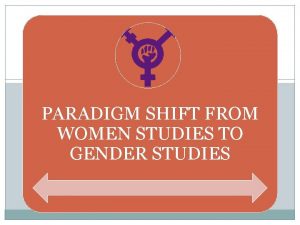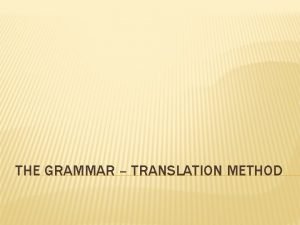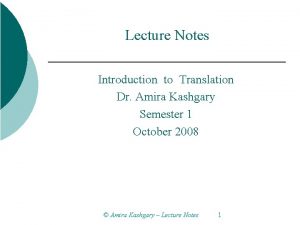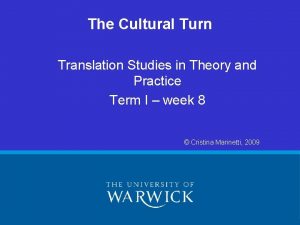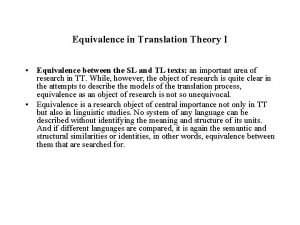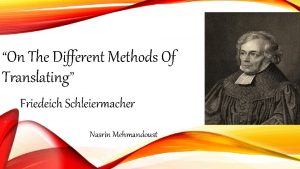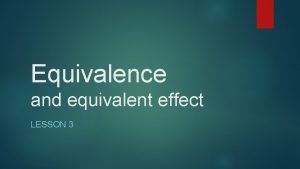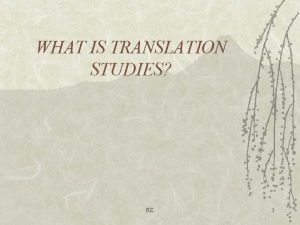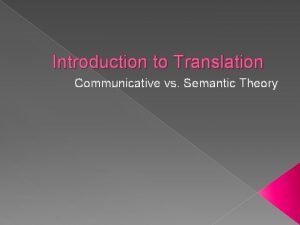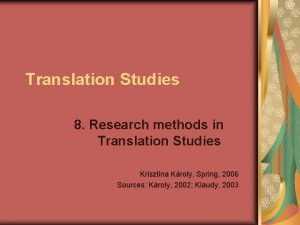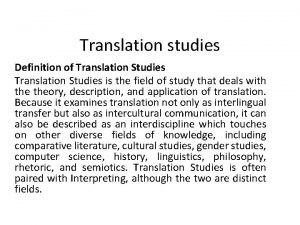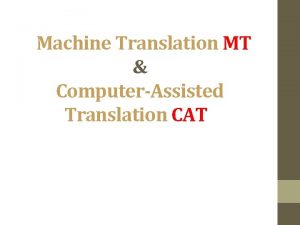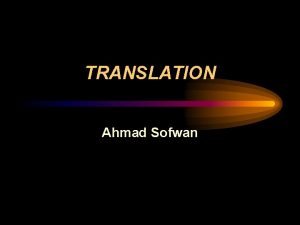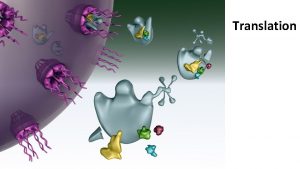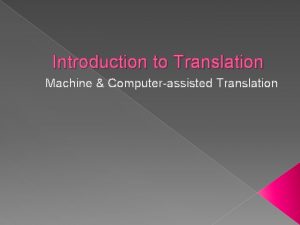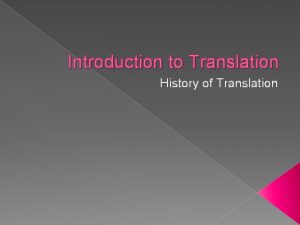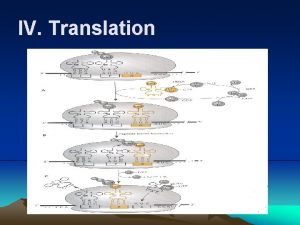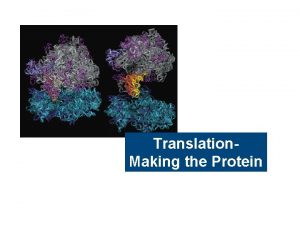What is Translation Studies Translationlanguageculture TranslationTranslating A Translation












- Slides: 12

What is Translation Studies? Translation-language-culture

Translation/Translating/ A Translation • • • A translation must give the words of the original. A translation must give the ideas of the original A translation should read like a translation A translation should read like an original work A translation may add to, or omit from the original A translation may never add to, or omit from the original • (T. Savory, The Art of Translation

When we read a work in translation we normally assume that it is much the same thing as reading the original, only more convenient. If anyone then challenged us to explain how a work in one language could still be ‘the same’ in another, with a different vocabulary, history and spirit, we might go on to concede that of course it could not be – that translations are necessarily inferior to original works, as translators are inferior to original writers; but until all of us can read all languages, translation will be a necessary evil. This note of resignation in talking about translations is so common now that it may come as a surprise to learn that there was a time when translation was regarded as a creative art, not a feebly parasitic one, and translators and original writers were not clearly distinguished. Rosslyn, F (1985), Pope’s Iliad. Bristol: Bristol Classical Press, p. IX

Translation • What is translation? • What are we studying? • Art • Process? ST>TT • Craft • Product? • Science • Relationship? ST<>TT TT

L. Tolstoy, Anna Karenin(a) 1877 All happy families are alike but an unhappy family is unhappy after its own fashion. (Rosemary Edmonds, 1954) All happy families resemble one another, but each unhappy family is unhappy in its own way. ( Louise and Aylmer Maude, 1918) Happy families are all alike; every unhappy family is unhappy in its own way. (Constance Garnett, .

L. Tolstoy, Anna Karenin(a) 1877 All happy families are alike but an unhappy family is unhappy after its own fashion. (Rosemary Edmonds, 1954) All happy families resemble one another, but each unhappy family is unhappy in its own way. ( Louise and Aylmer Maude, 1918) Happy families are all alike; every unhappy family is unhappy in its own way. (Constance Garnett, Все счастливые семьи похожи друг на друга, каждая несчастливая семья несчастлива по-своему.

Definitions and Aims 1 • ‘A translation is a valid representative of the original in the communicative act’ R. De Beaugrande (1978), Factors in a Theory of Poetic Translation. Assen: Van Gorcum.

Definitions and Aims 2 • Übersetzungswissenschaft ‘Translation Studies is to be understood as a collective and inclusive designation for all research activities taking the phenomena of translating and translation as their basis or focus’ (W. Koller, in Holmes)

Definitions and Aims 3 • • To describe the phenomena of translating and translation(s) as they manifest themselves in the world of our experience, and To establish general principles by means of which these phenomena can be explained and predicted. (James Holmes)

Descriptive Translation Studies • Product oriented • Function oriented • Process oriented Translation Theory Partial > hypothsis > axiom > postulate

Translation and context • On 5 th September 1607 Hamlet was performed on board the Dragon, anchored off the coast of Sierra Leone in West Africa. Among the audience were African dignitaries following a running paraphrase in Portuguese. The players did Richard II, too, further down the coast, before sailing on to India; unfortunately, there is no record of these Jacobean precursors of this ‘Shakespeare Wallah’ performing before the Great Moghul on his marble throne. (Wood, M (2005), In Search of Shakespeare. London: BBC Books, p. 330.

The purpose of theory • • • Can one translate without theory? Does theory help to translate? What is translation theory? How does theory relate to practice? Do translators reflect on what they do?
 Paradigm shift from women studies to gender studies
Paradigm shift from women studies to gender studies Merits and demerits of grammar translation method
Merits and demerits of grammar translation method Translation studies lecture notes
Translation studies lecture notes Cultural turn in translation studies
Cultural turn in translation studies Equivalence in translation
Equivalence in translation Schleiermacher on the different methods of translating
Schleiermacher on the different methods of translating Jakobson equivalence
Jakobson equivalence Wolfram wills
Wolfram wills Noun phrase example
Noun phrase example Semantic translation
Semantic translation Voice translation rules
Voice translation rules Transformation of a function
Transformation of a function Digital marketing case studies 2012
Digital marketing case studies 2012
